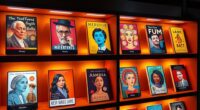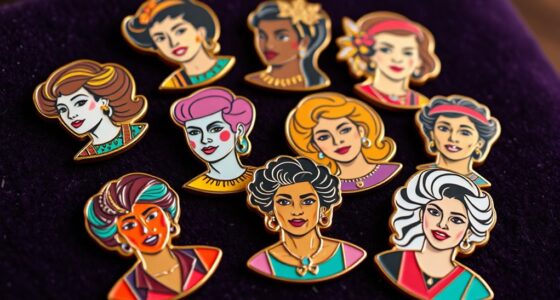If you’re curious about the hidden secrets of spies and intelligence work, there are some compelling biographies to explore. From the Cold War tales of Oleg Gordievsky to the daring early CIA years, these stories reveal complex moral dilemmas, covert operations, and personal sacrifices. They emphasize cultural understanding, resourcefulness, and strategic thinking essential for success. Keep exploring, and you’ll uncover insights into the shadowy world of espionage that most people never see.
Key Takeaways
- Profiles of renowned spies like Oleg Gordievsky reveal insider tactics, psychological challenges, and covert operations behind Cold War secrets.
- Biographies of early CIA agents explore agency culture, ambitious missions, and behind-the-scenes intelligence strategies.
- Personal accounts from military and intelligence officers highlight moral dilemmas, undercover risks, and secret missions.
- Stories uncover hidden layers of espionage, betrayal, and resourcefulness that shaped major geopolitical events.
- In-depth narratives reveal the human side of intelligence work, including psychological tolls and clandestine network-building.
The Art of Intelligence: Lessons from a Life in the CIA’s Clandestine Service
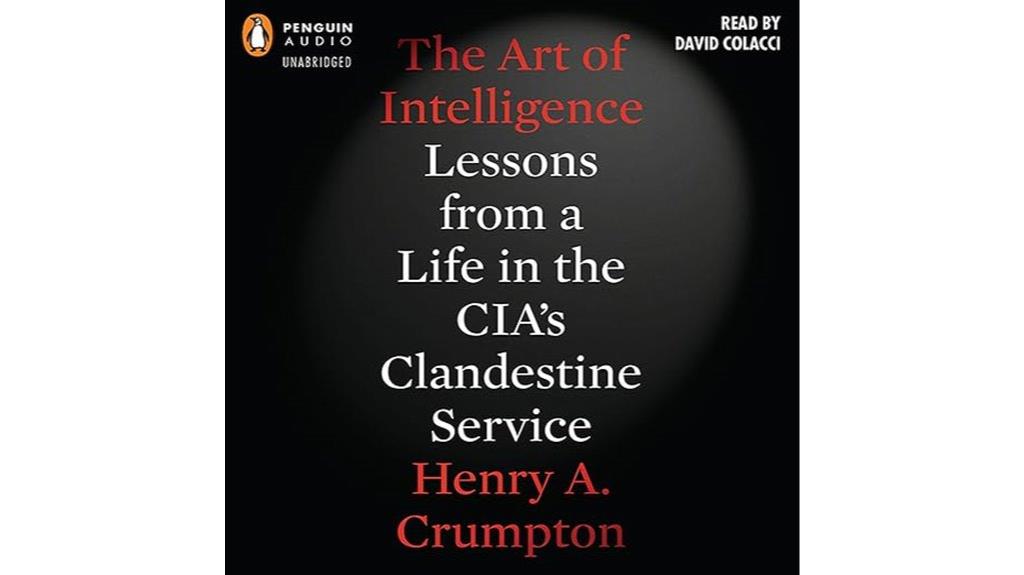
If you’re interested in understanding the real-world challenges and strategies behind covert operations, “The Art of Intelligence: Lessons from a Life in the CIA’s Clandestine Service” is a must-read. I’ve learned how building foreign networks and using tools like GIS overlays are vital for gathering intelligence. Crumpton emphasizes that modern warfare involves cross-cultural battles, not just armies. The book reveals how success depends on resourcefulness, adaptability, and understanding cultural nuances. It also highlights the risks officers face daily, showing that intelligence work is as much about human connections as it is about technology. This honest account offers valuable insights into the complex world of espionage.
Best For: readers interested in gaining an inside perspective on CIA operations, intelligence strategy, and the human elements of espionage.
Pros:
- Provides detailed insights into modern intelligence gathering, network building, and technological tools like GIS overlays.
- Humanizes the secretive world of espionage by sharing personal experiences and emphasizing the risks faced by officers.
- Highlights the importance of cultural understanding and adaptability in contemporary warfare and counterterrorism efforts.
Cons:
- Some information may be simplified or generalized due to the sensitive nature of intelligence work.
- The focus on personal stories might not appeal to readers seeking purely technical or strategic analysis.
- As a memoir, it may lack comprehensive coverage of all aspects of intelligence operations, focusing instead on specific experiences.
The Spy and the Traitor: The Greatest Espionage Story of the Cold War
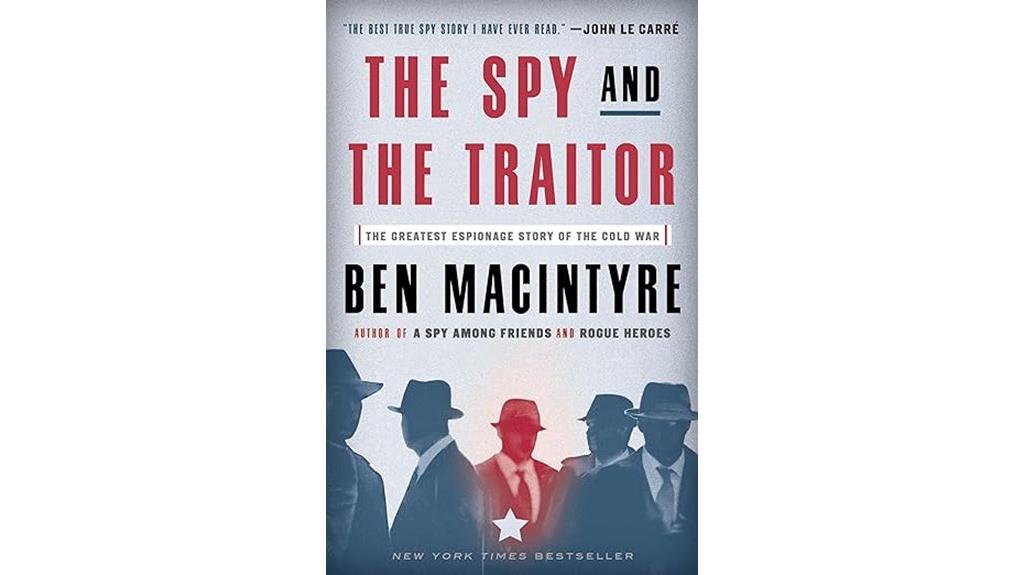
For readers interested in gripping true stories of espionage, “The Spy and the Traitor” offers a compelling look at one of the Cold War’s most remarkable double agents. Oleg Gordievsky, a KGB officer turned MI6 informant, risked everything to betray his homeland. His story unfolds amid Cold War tensions, highlighting the psychological toll of deception, the brutal tactics of the KGB, and the subtle, clever methods of Western intelligence. Gordievsky’s insights helped shape diplomacy and eased Cold War hostilities. It’s a thrilling, morally complex account of loyalty, sacrifice, and the high-stakes world of espionage that kept the world on edge.
Best For: readers who enjoy gripping, well-researched true espionage stories with deep psychological insights and historical context.
Pros:
- Engaging and suspenseful storytelling that reads like a novel
- Provides a nuanced portrayal of Cold War espionage and moral dilemmas
- Rich historical detail making complex events accessible and compelling
Cons:
- Contains brief references to harsh Soviet practices that may be distressing
- Some readers may find the detailed descriptions of espionage tactics technical or dense
- Focuses heavily on the psychological toll, which might be heavy for sensitive readers
Spy Handler: Memoir of a KGB Officer
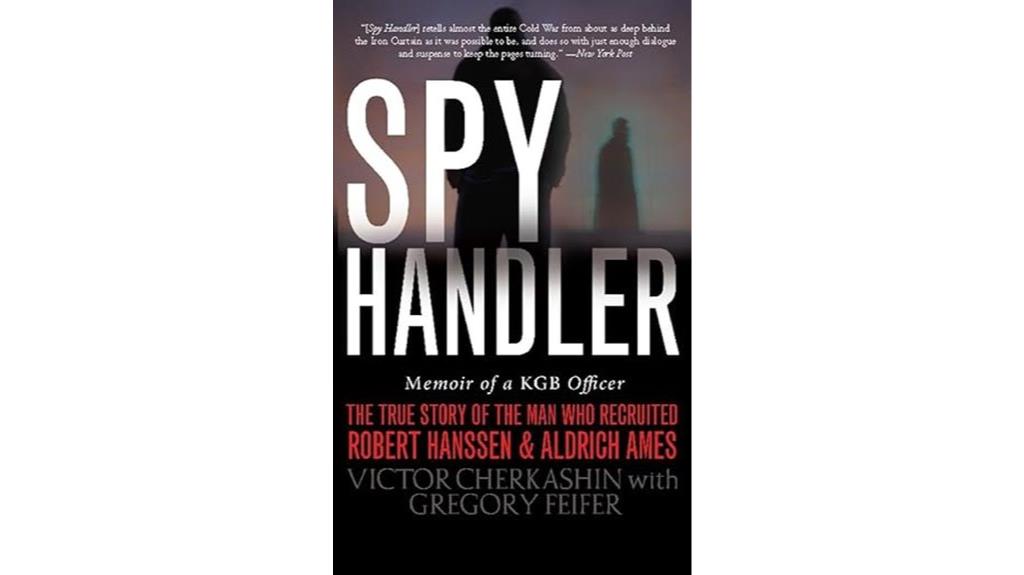
Anyone interested in understanding the inner workings of Cold War espionage will find “Spy Handler: Memoir of a KGB Officer” an essential read. I share insights from my career, handling spies like Hanssen and Ames, revealing that most traitors act from personal dissatisfaction rather than ideological motives. My narrative offers a clear view of the internal politics within the KGB, contrasting our pragmatic approach with Western agencies’ reliance on technology. I aim to humanize spies and shed light on the complex motivations behind betrayals, providing an honest, detailed account of intelligence work that challenges mainstream narratives and deepens understanding of Cold War espionage.
Best For: readers interested in Cold War history, espionage, and the inner workings of Soviet intelligence who seek a detailed, humanized perspective on spy operations and motivations.
Pros:
- Provides a rare inside look into KGB operations and internal politics.
- Challenges mainstream narratives by emphasizing personal motives over ideology.
- Well-written, detailed account that humanizes spies and offers psychological insights.
Cons:
- The narrative structure can be abrupt and sometimes lacks cohesion.
- The writing style is somewhat detached and may feel distant to some readers.
- The translation quality, while generally good, may affect the reading experience for non-native speakers.
The Very Best Men: The Daring Early Years of the CIA
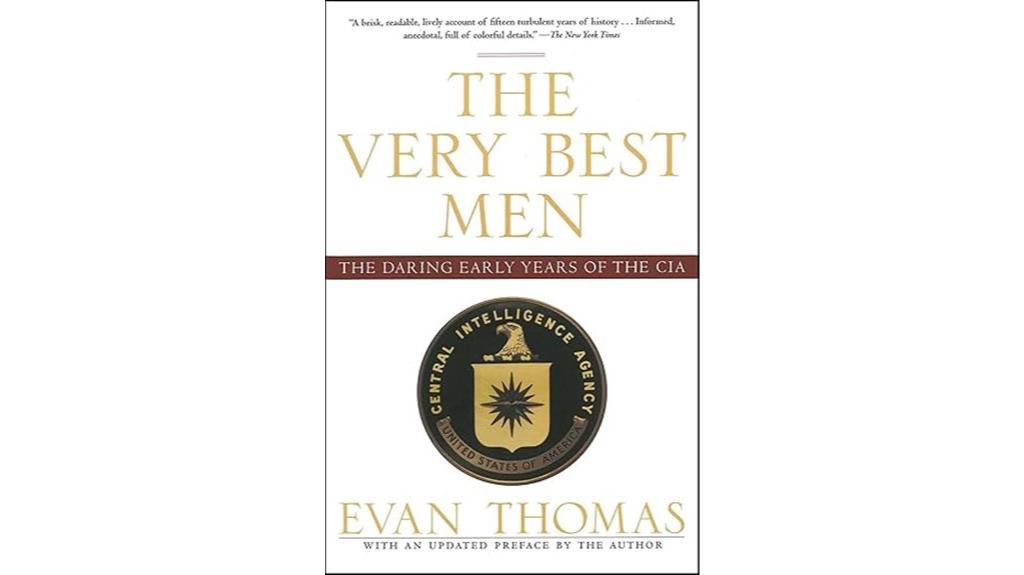
The book “The Very Best Men: The Daring Early Years of the CIA” stands out as an essential read for history enthusiasts and those fascinated by the origins of American intelligence. I was captivated by how Evan Thomas brings to life the stories of key figures like Wisner, Barnes, FitzGerald, and Bissell, highlighting their daring efforts and flaws. The book offers a vivid look at the agency’s culture, rooted in Ivy League backgrounds and ambitious ideals. It’s both inspiring and sobering, revealing how good intentions sometimes led to excesses. With detailed research and engaging storytelling, it’s a must-read for anyone wanting to understand the early, formative years of the CIA.
Best For: history enthusiasts and readers interested in the early history and culture of the CIA and American intelligence operations.
Pros:
- Engaging storytelling backed by access to CIA archives.
- Provides a nuanced, balanced view of key figures and their contributions.
- Offers insightful analysis of the culture, ideals, and excesses of early CIA operations.
Cons:
- May focus heavily on individual biographies, potentially less on broader geopolitical contexts.
- Some readers might find the detailed research dense or technical.
- The portrayal of agency flaws might be seen as overly critical by those favoring a more positive view.
The Recruiter: Spying and the Lost Art of American Intelligence
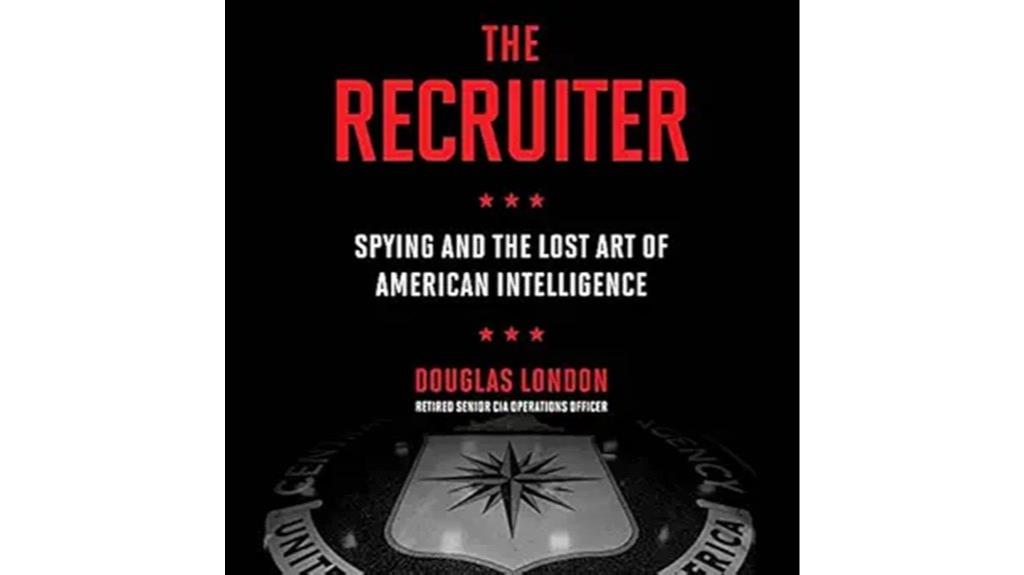
If you’re interested in the true art of espionage and want an honest, behind-the-scenes look at CIA operations, “The Recruiter: Spying and the Lost Art of American Intelligence” is an essential read. Douglas London shares candid insights into human intelligence, recruitment, and the personal toll of spy work. He critiques post-9/11 leadership failures, highlighting bureaucratic pitfalls and the decline of HUMINT. His stories of clandestine missions and balancing diplomacy with covert actions reveal the complexities of espionage. While some criticize his tone, his deep patriotism and authenticity make this book a compelling call for a return to traditional spycraft and organizational integrity.
Best For: readers interested in authentic espionage experiences, intelligence professionals, and those seeking a critical perspective on CIA operations and leadership.
Pros:
- Offers honest, detailed insights into human intelligence and recruitment techniques.
- Highlights the importance of traditional espionage methods and organizational integrity.
- Authentically portrays the personal and professional challenges of spy work, making it relatable and compelling.
Cons:
- Some readers may find the tone overly negative or self-critical regarding CIA management.
- Necessary redactions limit the disclosure of specific intelligence details, which might frustrate those seeking technical depth.
- The critique of bureaucratic issues and leadership may come across as overly harsh or generalized for some audiences.
Sea Stories: My Life in Special Operations
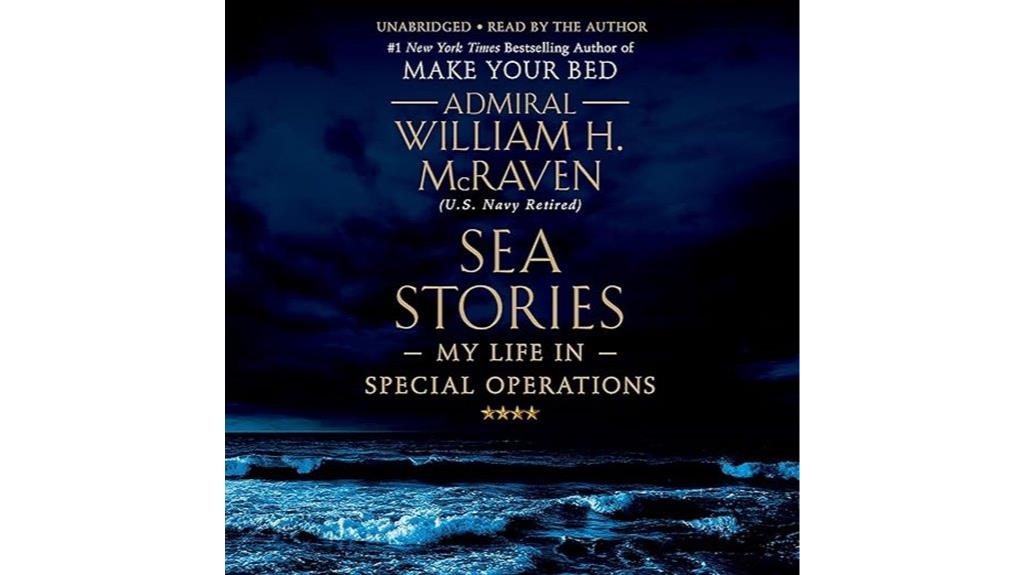
Sea Stories: My Life in Special Operations offers a gripping firsthand account that appeals most to readers interested in military life, daring missions, and the personal sacrifices of servicemen. I share my experiences from serving in the Navy between 1970 and 1980, including covert operations in Cuba under Fidel Castro, working alongside Navy SEALs, and serving as a gunboat cook. My stories highlight moments of heroism, humor, and reflection on the demanding nature of military service. I emphasize the courage, perseverance, and loyalty required to protect our nation, offering insights into the strategic planning and behind-the-scenes efforts that define special operations.
Best For: readers interested in military history, special operations, inspiring stories of heroism, and personal accounts of service and sacrifice.
Pros:
- Engaging and personal storytelling that provides authentic insights into military life and covert missions.
- Highlights themes of courage, perseverance, and loyalty that inspire and educate readers.
- Offers behind-the-scenes perspectives on strategic planning and operational details that appeal to military enthusiasts.
Cons:
- Some readers may find the detailed references to government agencies and military titles excessive or dense.
- The narrative occasionally includes political and societal commentary that might distract from the main stories.
- As a memoir focused on personal experiences, it may lack broader historical context for some readers unfamiliar with military operations.
Professional Courage: My Journey in Military Intelligence
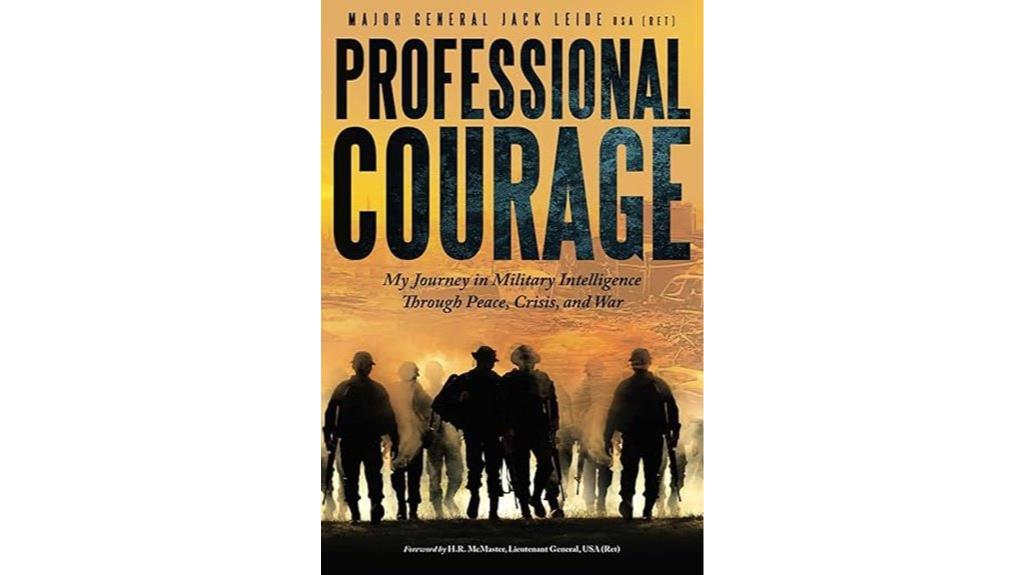
For anyone interested in understanding the true meaning of professional courage within military intelligence, “Biographies of Intelligence Officers” offers invaluable insights. My journey began as an Airborne Infantry officer, but true courage emerged when I shifted into intelligence roles during pivotal moments like Vietnam, Tiananmen Square, and the Gulf War. I learned that honesty and bravery are essential, even when confronting powerful figures or delivering difficult truths. Every decision demanded quick thinking and unwavering integrity. This path taught me that protecting lives and national security requires not only skill but relentless courage to face challenges head-on, regardless of opposition or personal risk.
Best For: military and intelligence professionals, students, and anyone interested in leadership, integrity, and the role of intelligence in national security.
Pros:
- Offers firsthand insights and detailed anecdotes from a decorated intelligence professional.
- Emphasizes the importance of honesty, bravery, and quick decision-making in high-pressure situations.
- Provides valuable lessons on organizational structure, strategic thinking, and ethical responsibilities in military intelligence.
Cons:
- As a personal memoir, it may focus heavily on individual experiences, which could limit broader applicability.
- Some readers might find the technical aspects of intelligence operations less detailed or overly simplified.
- The book’s focus on specific historical events may not cover all contemporary intelligence challenges.
Petty: The Biography
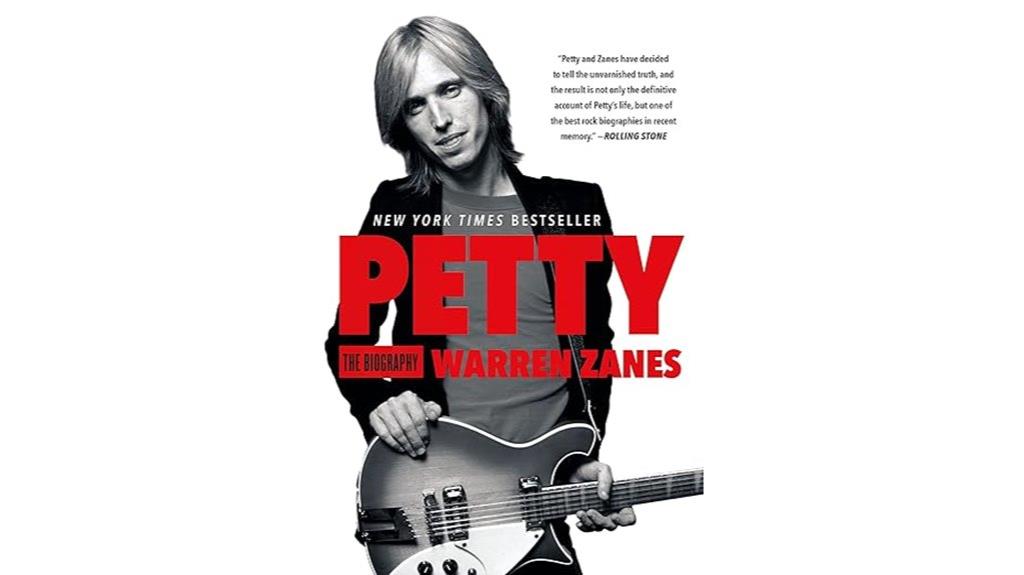
Petty: The Biography stands out as an essential read for music lovers and anyone interested in authentic stories of perseverance and artistry. I was drawn in by its intimate look at Tom Petty’s life, revealing his humility, resilience, and dedication to his craft. Warren Zanes captures Petty’s personality beyond the stage, exploring his struggles, relationships, and deep passion. The book details his journey through the music industry, highlighting key moments, collaborations, and the cultural impact of his work. It’s honest and inspiring, offering a genuine portrait of a legendary artist who stayed true to himself amid fame’s challenges.
Best For: music enthusiasts, fans of Tom Petty, and readers seeking authentic stories of perseverance and artistic integrity.
Pros:
- Offers an intimate, honest portrayal of Tom Petty’s life and personality.
- Well-written and engaging, with detailed insights into his career and relationships.
- Inspires readers through themes of resilience, humility, and dedication to craft.
Cons:
- Some fans note the omission of detailed information about The Traveling Wilburys albums.
- The book may focus more on broad narrative than on in-depth technical aspects of music production.
- Slightly limited coverage of Petty’s later years and certain personal struggles.
Left of Boom Book
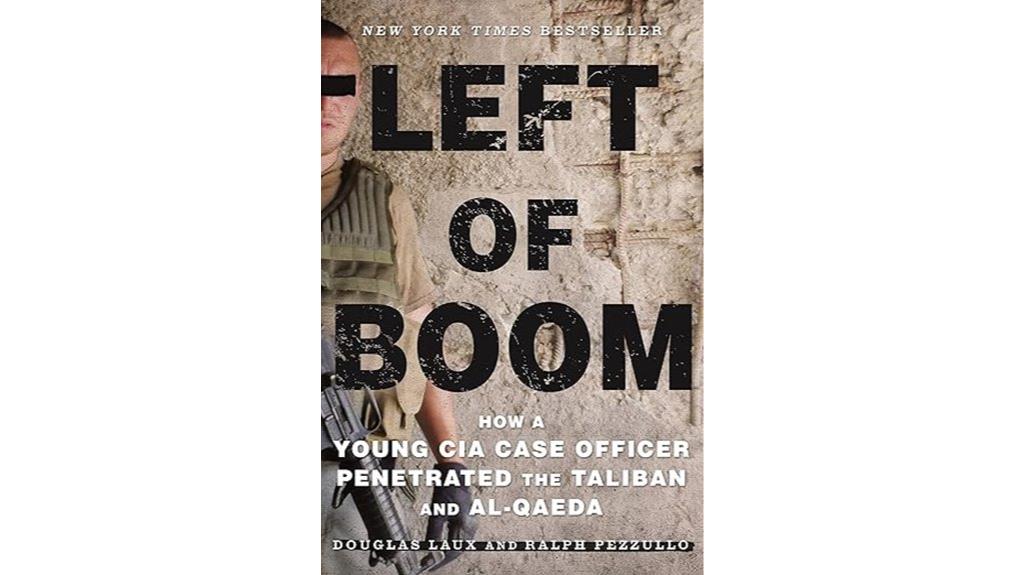
If you’re interested in gaining an authentic, behind-the-scenes look at covert intelligence work, “Left of Boom” is an excellent choice. Doug Laux shares his experiences infiltrating Taliban and Al-Qaeda networks in Afghanistan and Syria after 9/11, blending humor with stark reality. His self-taught Pashto skills highlight the importance of local language expertise. The book reveals how bureaucratic red tape hampers operations, yet agents succeed through ingenuity and dedication. Laux’s candid storytelling exposes the sacrifices, personal struggles, and absurd moments faced in the field. It’s a compelling, eye-opening account that demystifies intelligence work and underscores the human side of heroism behind closed doors.
Best For: readers interested in authentic, behind-the-scenes insights into covert intelligence operations and counterterrorism efforts.
Pros:
- Offers a compelling, candid perspective on intelligence work, blending humor with serious realities.
- Highlights the importance of local language skills and cultural knowledge in field operations.
- Provides personal anecdotes and stories that humanize the sacrifices and dangers faced by agents.
Cons:
- Extensive redactions can obscure specific details, making some sections difficult to interpret.
- Some readers may find the tone slightly naive or overly focused on personal struggles.
- The emphasis on personal stories might detract from broader geopolitical analysis for some audiences.
The Devils Chessboard Book about Allen Dulles and the CIA
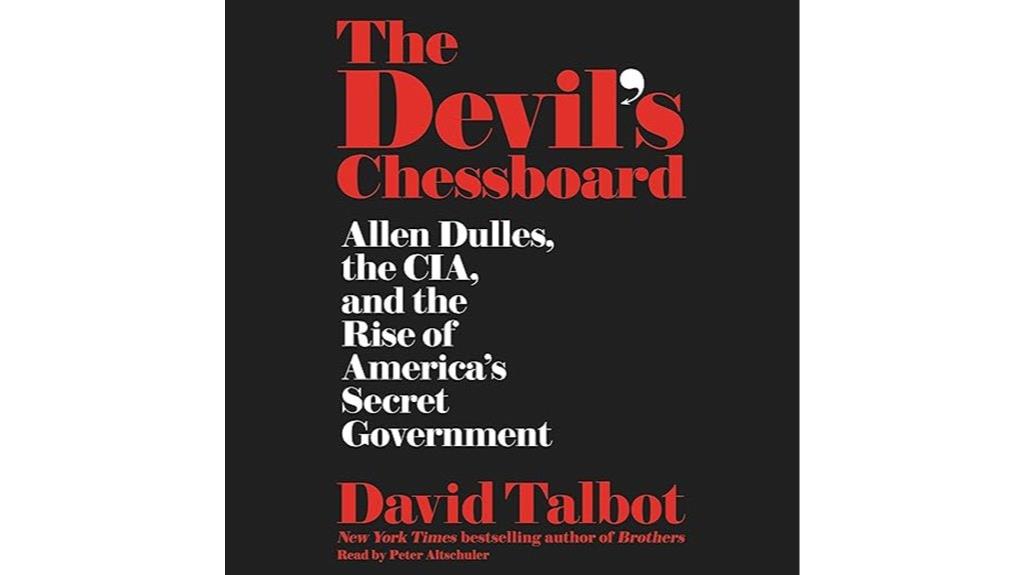
Anyone interested in uncovering the hidden history of American intelligence and understanding how Allen Dulles shaped the CIA and the secret government will find “The Devils Chessboard” essential. This book by David Talbot reveals Dulles’s pivotal role in establishing a shadowy network that influenced U.S. foreign policy and orchestrated coups in Iran, Guatemala, Congo, and elsewhere. It exposes his treacherous dealings with Nazis after WWII, his manipulation of key figures like Lee Harvey Oswald, and his deep ties to corporate interests and the military-industrial complex. Ultimately, it paints Dulles as a master manipulator, playing a dangerous global chess game that has shaped America’s covert operations and global interventions.
Best For: readers interested in uncovering the hidden history of American intelligence, the CIA, and their influence on global and domestic politics.
Pros:
- Provides a detailed and well-researched account of Allen Dulles’s role in shaping the secret government and CIA operations.
- Highlights historical covert interventions, coups, and cover-ups with supporting facts and testimonies.
- Encourages critical thinking about U.S. foreign policy, corporate interests, and the legacy of covert actions on democracy.
Cons:
- Can be dense and complex, potentially challenging for readers unfamiliar with historical or political contexts.
- Some may perceive the narrative as heavily critical or conspiratorial, leading to skepticism.
- The focus on controversial topics might evoke emotional reactions or controversy among different audiences.
Every Weapon I Had: A Vietnam Vets Long Road to the Medal of Honor
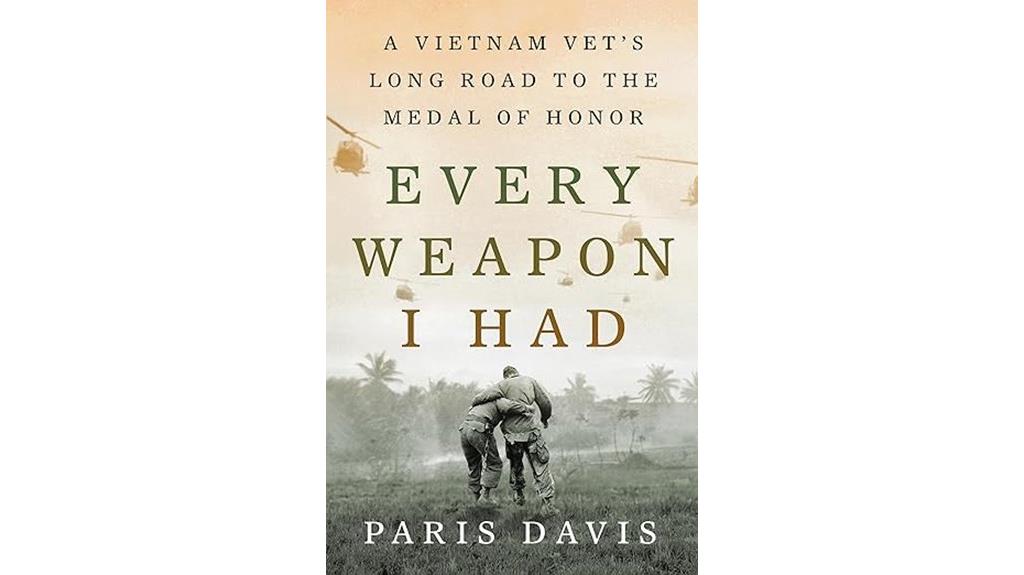
Every Weapon I Had: A Vietnam Vet’s Long Road to the Medal of Honor is a must-read for those interested in personal stories of heroism and the ongoing fight for justice within the military. This memoir by Colonel Paris Davis reveals his extraordinary bravery, leadership, and sacrifices during the Vietnam War, despite facing racial discrimination. Davis, a Black officer, waited 58 years for the recognition he deserved, highlighting systemic injustice. His story is a powerful affirmation to perseverance, integrity, and the importance of honoring true heroism regardless of race or time. It’s an inspiring account that sheds light on overlooked moments of courage and the fight for equality.
Best For: readers interested in military history, personal stories of heroism, civil rights, and those seeking inspiration from stories of perseverance and justice.
Pros:
- Engaging and vivid storytelling that brings Vietnam War experiences to life
- Highlights important issues of racial discrimination and systemic injustice
- Inspires readers with a powerful message of perseverance, integrity, and heroism
Cons:
- May evoke emotional responses due to its intense and personal content
- Focused heavily on one individual’s story, which may not appeal to all readers
- Some readers might find the detailed military jargon challenging without background knowledge
Lincoln
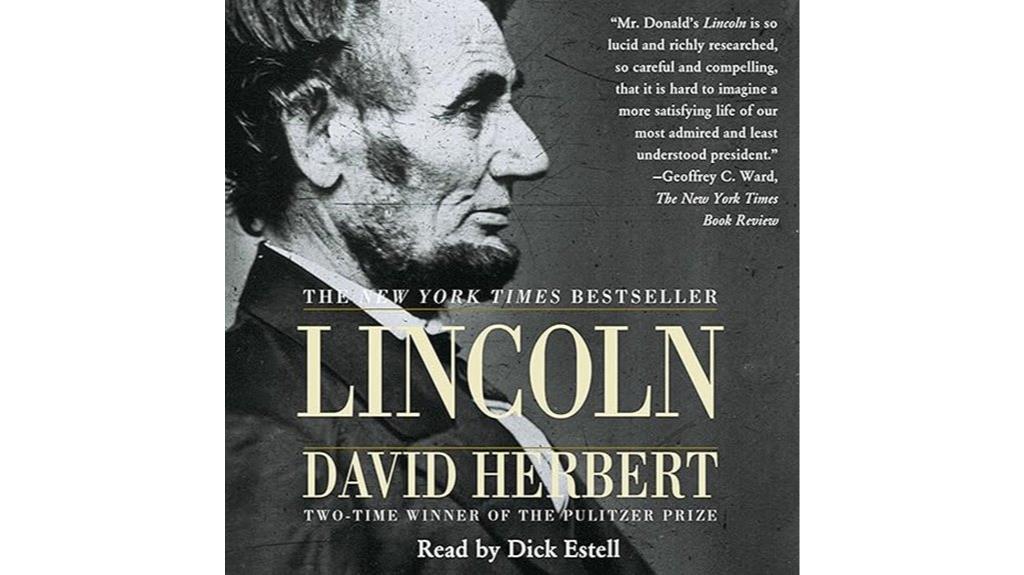
For readers seeking a nuanced understanding of Abraham Lincoln’s character and leadership, David Herbert Donald’s 1996 biography *Lincoln* stands out as an exceptional choice. I found it invigoratingly honest, stripping away myths to reveal Lincoln’s flaws and humanity. Donald’s vivid storytelling focuses on Lincoln’s decision-making, personal struggles, and political skill, especially during the Civil War. The book balances admiration with critique, highlighting Lincoln’s early hardships, moral doubts, and complex beliefs about race. It’s accessible yet detailed, making Lincoln’s evolution and leadership clear. This biography humanizes a legend, providing insights into the man behind the presidency’s immense burden.
Best For: readers seeking a comprehensive, humanizing, and critically balanced biography of Abraham Lincoln that explores his personal struggles, leadership, and historical significance.
Pros:
- Highly praised for clarity, depth, and engaging storytelling that humanizes Lincoln
- Balanced approach that highlights both Lincoln’s admirable qualities and flaws
- Focuses on Lincoln’s decision-making process and personal experiences, providing valuable insights
Cons:
- Some readers might find the emphasis on Lincoln’s flaws less inspiring than more idealized biographies
- The detailed analysis of political and personal nuances may be dense for casual readers
- It may underplay or simplify certain aspects of Lincoln’s philosophical beliefs or racial ideas in favor of realism
Factors to Consider When Choosing Intelligence Officer Biographies
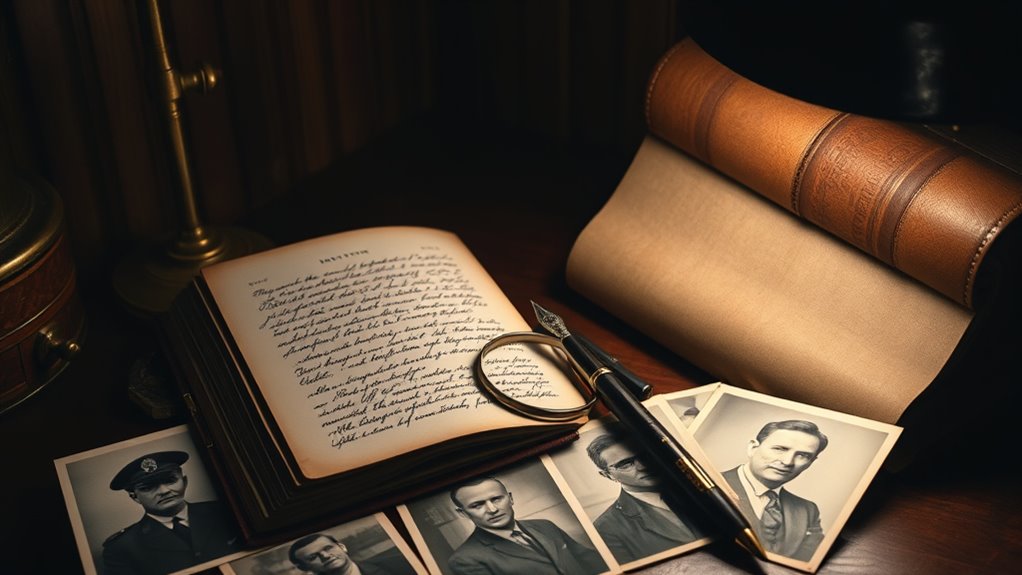
When selecting intelligence officer biographies, I focus on their authenticity and credibility to guarantee the information is reliable. I also look for depth of personal insight and accurate historical context to gain a well-rounded understanding. Additionally, I consider the level of narrative engagement and the specificity of operational details to find stories that are both compelling and informative.
Authenticity and Credibility
How can you determine if an intelligence officer’s biography is trustworthy? First, check if it’s authored by someone with credible expertise or firsthand intelligence experience. Reliable biographies often include detailed references, citations, or sources that support the facts and claims made. Be cautious of sensationalism or exaggerated statements, which can undermine credibility; a balanced narrative is key. Transparency about redactions, classified details, or potential biases also signals honesty. Additionally, see if reputable experts or institutions have reviewed or endorsed the biography—this adds to its authenticity. By scrutinizing these factors, you can better assess whether the account is genuine or potentially compromised. Trustworthy biographies stand on a foundation of verifiable facts and transparent storytelling, ensuring you gain accurate insights into the officer’s true story.
Depth of Personal Insight
Evaluating the depth of personal insight in an intelligence officer’s biography offers a window into the human side of espionage that often remains hidden behind operational details. Personal stories reveal the emotional and psychological toll of covert work, helping readers grasp the sacrifices, fears, and motivations that drive these officers. Biographies enriched with anecdotes and reflections shed light on how they navigate loyalty, trust, and moral dilemmas in high-stakes environments. Including details about family, frustrations, or moments of doubt humanizes these professionals, making their experiences more relatable. Considering the level of personal insight guarantees the biography conveys internal struggles and humanizes the often mysterious world of espionage, offering a nuanced understanding that goes beyond mere facts to reveal what truly shapes their decisions.
Historical Context and Accuracy
Choosing an intelligence officer biography that accurately reflects historical realities requires careful attention to the sources and context provided. I look for well-documented accounts supported by multiple credible references to verify factual integrity. It’s important that the author demonstrates a solid understanding of the geopolitical, cultural, and operational environments surrounding the officer’s career. Specific dates, events, and operational details should align with established historical records, avoiding reliance on anecdotal or unverified claims that can distort facts. Additionally, I assess whether the biography discusses the broader political and strategic landscape, offering a nuanced view of the officer’s decisions and actions. This thorough approach helps me identify biographies rooted in accuracy and context, providing a true picture of the officer’s role in history.
Narrative Engagement Level
What makes an intelligence officer biography truly engaging often hinges on its storytelling approach. A fast-paced, suspenseful style keeps readers on the edge of their seats, making complex espionage activities easier to understand. Vivid personal anecdotes and inside details about covert operations deepen emotional connection and curiosity. Well-developed characters that explore spies’ psychological struggles and moral dilemmas add relatability and depth. Balancing historical context with personal stories prevents the narrative from feeling dry or overly technical. Including descriptive accounts of espionage techniques and operational challenges further captivates readers. Ultimately, the most engaging biographies blend these elements seamlessly, creating a gripping story that reveals secrets while maintaining interest from start to finish.
Specificity of Operations
How can you tell if an intelligence officer biography will give you a clear picture of real-world espionage? Look for detailed descriptions of operational techniques like recruitment, surveillance, and covert communication methods. A strong biography includes specific case examples that reveal the complexities and dangers of field operations. Check if it discusses the technological tools and evolving tradecraft used throughout the officer’s career, providing insight into how espionage tactics develop. Additionally, assess whether the book explains the organizational structure and decision-making behind missions, giving context to the operations. Finally, verify it offers concrete details about the agent’s role in shaping national security policies, highlighting the real-world impact of their work. This specificity helps you understand espionage beyond surface-level stories.
Ethical and Moral Perspectives
When evaluating biographies of intelligence officers, it’s essential to contemplate how they portray moral and ethical decision-making. I look for stories that reveal how officers navigate complex dilemmas, like balancing national security with personal integrity. These biographies often highlight morally ambiguous choices, such as espionage tradecraft, deception, and asset management, illustrating the grey areas officers operate in. I value accounts that address the moral costs of covert actions—betrayal, deception, and potential harm—because they offer a nuanced view of ethical challenges. Additionally, stories that explore loyalty, justice, and personal sacrifice shed light on internal conflicts that shape an officer’s character and legacy. These insights help me understand the true moral landscape officers face and the integrity they uphold amid difficult circumstances.
Relevance to Interests
Choosing the right intelligence officer biography depends on how well it aligns with your specific interests in the field. Think about whether you’re drawn to covert operations, organizational politics, or technological innovations. Consider if the biography covers the regions or eras that fascinate you, like Cold War espionage or modern counterterrorism efforts. Reflect on whether you prefer personal stories, strategic insights, or professional analysis, and select accordingly. Look for biographies written by or featuring firsthand accounts from officers with similar roles or backgrounds, guaranteeing relevance. Finally, ensure the book discusses the challenges, successes, and failures that resonate with your curiosity or research focus. Matching these factors helps you choose a biography that truly deepens your understanding.
Frequently Asked Questions
What Undisclosed Personal Details Are Often Omitted From These Biographies?
I’ve noticed that these biographies often omit personal details like family backgrounds, romantic relationships, and political beliefs. They also avoid revealing specific operations or undercover work, as these could compromise security. Additionally, details about personal struggles or failures are often left out to preserve a heroic image. I find it fascinating how much is kept hidden, highlighting the secretive nature of their work and the importance of protecting sensitive information.
How Do These Biographies Reveal Internal Conflicts Within Intelligence Agencies?
Peering behind the curtain, I see these biographies often reveal internal conflicts like a mirror reflecting hidden struggles. They expose the tension between loyalty and morality, revealing how officers grapple with secret orders or ethical dilemmas. These stories show that beneath the surface of espionage, there’s a constant battle within—where personal beliefs clash with duty—unmasking the human side of intelligence work that many never see.
Are There Any Controversial Secrets Uncovered in These Stories?
Yes, many of these biographies uncover controversial secrets that shake the foundations of trust and national security. I’ve read stories exposing covert operations, double agents, and government cover-ups that sparked debates worldwide. These revelations often challenge official narratives, making us question who’s really in control. It’s fascinating and unsettling to see how personal sacrifices and hidden agendas intertwine, exposing truths that some would rather keep buried forever.
What Impact Do These Biographies Have on Public Perception of Espionage?
These biographies act like a double-edged sword, shaping how we view espionage. They reveal the human side of spies, making the secret world more relatable and fascinating. But they can also spark skepticism, making us question what’s real versus fiction. Overall, I believe they deepen our curiosity and understanding, turning the shadowy domain of intelligence into a compelling story that feels closer to home.
How Do Authors Balance Truth and Confidentiality in Their Narratives?
Authors balance truth and confidentiality by carefully selecting which details to reveal, often blending factual events with plausible scenarios. I focus on maintaining authenticity while respecting sensitive information, ensuring the story remains compelling without jeopardizing sources or operations. I use creative storytelling techniques to fill gaps, always endeavoring for honesty without crossing ethical boundaries. This delicate balance helps keep readers engaged while safeguarding confidential secrets.
Conclusion
These biographies are like secret maps, guiding us through hidden worlds where trust and deception intertwine. Each story is a key, revealing doors to unseen truths and silent sacrifices. As you explore these pages, remember that behind every shadow there’s a light of courage. Embrace these tales—they’re whispers from the unseen, reminding us that even in darkness, the human spirit’s spark can illuminate the way.


